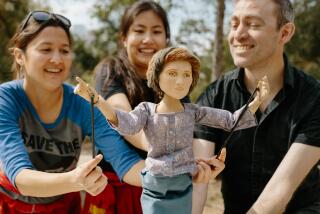HIV-Positive Muppet Not for U.S., PBS Says
The Public Broadcasting Service sent a letter to a group of concerned lawmakers Tuesday assuring them that no public funding is going toward the introduction of an HIV-positive Muppet in the South African production of the children’s show “Sesame Street,” while reiterating that there are no plans to introduce a similar character in the U.S.
PBS President Pat Mitchell was responding to a letter from House Energy and Commerce Committee Chairman W.J. “Billy” Tauzin (R-La.) and five members of the committee, which has budgetary oversight of public broadcasting.
Tauzin’s letter, sent late Friday, expressed concern that the character is inappropriate for the show’s 2- to 4-year-old viewers. It came just days after oversight hearings on public broadcasting, and Mitchell said in her letter that she was unaware of the plans for the character when she testified.
Tauzin’s office jumped on the issue after an executive at Sesame Workshop, the show’s producer, was quoted as saying the character developed for South Africa’s “Takalani Sesame” might appear in the U.S. version of the show. Sesame Workshop said the executive misspoke and there had been no discussions about bringing the character to the original program.
Mitchell pointed out in her letter that Tauzin’s staff was notified that the character would not join the U.S. show the morning that his letter went out; however, Tauzin aide Ken Johnson said the congressman “was under the impression that plans were moving forward,” adding, “We had a real simple argument: Why can’t kids just be kids for a while? They’re going to grow up fast enough and learn about AIDS, world famine, terrorism soon enough.”
“Our concern really lies with the target audience of ‘Sesame Street,’ ” said an aide to Rep. Fred Upton (R-Mich.), one letter signer. “These are issues that are very serious and may be more appropriate with audiences of an older level that have a greater emotional and intellectual capacity.”
After PBS’ response, Johnson said the issue will be dropped. “It’s over as far as we’re concerned.”
Although the matter at hand appears to have been settled, the reaction underscores political friction regarding how to deal with matters of sexual education and health--particularly in regard to children--as well as past criticism of PBS for promoting what some have characterized as a liberal agenda.
Democrats on the committee were still rallying to PBS’ defense. “I wouldn’t be troubled if they did use [the character] in the U.S., and I’m surprised some of these Republicans are making such a big fuss,” said Rep. Henry A. Waxman (D-Los Angeles). “There are going to be millions of orphans around the world.... I just think it’s a misplaced priority for them to be focusing on ‘Sesame Street’ and its attempt to have a character that will allow children to understand that those that may have HIV or any other disability can live side by side with other children.”
Waxman added that it was inappropriate for members of Congress to get involved in “day-to-day decisions on content” of PBS shows. Rep. John D. Dingell (D-Mich.) also expressed support for PBS and “Sesame Street,” saying the show has “done much to educate our children and demystify many of the social issues of our times.”
In her letter, Mitchell said PBS “has no relationship with Sesame Workshop regarding its South African programming.”
She said the U.S. show receives $4.8 million in federal funds, plus additional money from local PBS stations, some of which may be public money. About $1.6 million from the show’s product sales gets reimbursed to PBS.
Mitchell added: “I understand that the [U.S. Agency for International Development] contributed funding to the production of ‘Takalani Sesame.’ ”
Robert Knezevic, assistant vice president of international co-productions at Sesame Workshop, said each country’s co-production does its own research and would have to decide independently about the character.
Sesame Workshop was initially reluctant to develop the character for South Africa because it hadn’t conducted appropriate research, he said, but the production’s partners--which include the South Africa Department of Education, national broadcaster SABC, a corporate sponsor and USAID--insisted that it would serve a need. “Takalani Sesame” is targeted to a 3- to 7-year-old audience.
About 20% of the adult population in South Africa is infected with the AIDS virus, according to the Joint United Nations Program on HIV/AIDS.
Drew Altman, president of the nonprofit Kaiser Family Foundation, which studies health issues in South Africa and the U.S., said the South African Muppet could be helpful for young people “or a really bad thing.”
“It depends entirely on how the concept is executed,” he said, suggesting that sexually explicit messages wouldn’t be appropriate but messages to help young viewers cope with growing up in a society in which HIV and AIDS are rampant would be. “I would assume that the people involved are sensible.... I wouldn’t assume they are going to use a Muppet to convey safe-sex messages to 3-year-olds.”
Sesame Workshop said the new female Muppet, which doesn’t yet have a name, will be used to deal with issues such as the “de-stigmatization of people with HIV/AIDS” and coping with illness and loss. The Muppet will debut Sept. 30.
Jensen reported from New York and Fackler from Washington.
More to Read
Sign up for Essential California
The most important California stories and recommendations in your inbox every morning.
You may occasionally receive promotional content from the Los Angeles Times.










